Book contents
- Frontmatter
- Contents
- List of Illustrations
- Preface
- Abbreviations
- Chapter 1 The Experience of Economic Reform
- Chapter 2 Incomes and Their Meanings
- Chapter 3 Jobs, Work and Fairness in the Wake of Labour Market Reform
- Chapter 4 Working Families: Struggling with the Costs of Reform
- Chapter 5 Civil Society and Communities
- Chapter 6 Politics, Power and Institutions
- Chapter 7 Judgements on Economic Reform
- Appendix A Chronology of Economic Reform
- Appendix B Methods and Procedures: Middle Australia Project
- Appendix C Supplementary Tables
- Appendix D Income and Equivalent Household Income
- Notes
- Index
Chapter 6 - Politics, Power and Institutions
Published online by Cambridge University Press: 22 September 2009
- Frontmatter
- Contents
- List of Illustrations
- Preface
- Abbreviations
- Chapter 1 The Experience of Economic Reform
- Chapter 2 Incomes and Their Meanings
- Chapter 3 Jobs, Work and Fairness in the Wake of Labour Market Reform
- Chapter 4 Working Families: Struggling with the Costs of Reform
- Chapter 5 Civil Society and Communities
- Chapter 6 Politics, Power and Institutions
- Chapter 7 Judgements on Economic Reform
- Appendix A Chronology of Economic Reform
- Appendix B Methods and Procedures: Middle Australia Project
- Appendix C Supplementary Tables
- Appendix D Income and Equivalent Household Income
- Notes
- Index
Summary
While many decry the role that politicians play, only the politicians can make changes to the way the country conducts its business. Change can not come from the bureaucracy no matter how well motivated or gifted because the bureaucracy has no authority to rank priorities or make decisions. Nor can change come from the media and the opinions of columnists, no matter how important. In the end politicians have to have the foresight to see the need for change and the courage and strength to carry it through.
Paul Keating, Prime Minister 1991–96In this chapter we shall first look squarely at middle Australia's perceptions and attitude towards big business, and government regulation of the corporate sector. We want to know, as far as we can, how middle Australia understands economic reform. How do they make sense of it? Do they see it as wind and rain, as a quasi-natural thing that just happens without visible agency? Or do they see it as something that is done politically, either to them, or for them and with them? How does the experience of economic reform flow through into attitudes, convictions and even prejudices that people hold about the politics of reform, the changing structure of the society and the distribution of its social and economic costs and benefits? Who do middle Australians perceive to be the winners and losers from economic reform?
- Type
- Chapter
- Information
- The Experience of Middle AustraliaThe Dark Side of Economic Reform, pp. 138 - 167Publisher: Cambridge University PressPrint publication year: 2003



